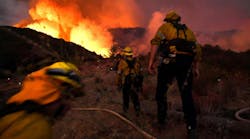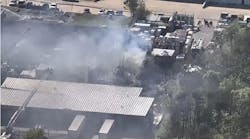It has been my experience that everyone must decide what they are good at and concentrate on their strong points. Recently, a dear friend reminded me of this important fact of life. He was kind enough to bring a potentially serious error to my attention. It seems that I was so involved in a wide range of projects that I seemingly drifted into a wrong direction. Where I should have been operating in one arena, I suddenly found myself miles off course.
There was a time when people who knew me would accuse me of being a "jack of all trades" and a master of none. My wife once accused me of having a Superman complex. She pointed out that I was trying to be all things to all people. I was very poor at using the word "no" in my relationships with the various groups in which I hold membership.
I was traveling back and forth to work with the Newark Fire Department. At the same time, I was an active member and chief officer in the Adelphia Fire Company. My consulting practice consumed great quantities of my time. There were the trips to the major fire conventions and the speaking engagements I made around the country, not to forget my service as the state fire marshal for the New Jersey Army National Guard.
How did I ever do this? How was all of this possible, when added to the requirements of being a husband and father? I guess the best answer involves the honest evaluation that only the passage of time has allowed me to undertake. I ran my life like a small, independent building contractor. You know the type. They start a job, and then move on to another, then double back and work a bit on the first job and then start a third.
I now know that I was wrong. I guess that is what you call experience. The thought that I was operating in this manner never occurred to me. As a matter of fact, I can even remember agreeing with a friend at one point back then, when he complained of how hard it was to get a contractor to finish painting his back porch. I was living the same sort of life-and-career combination, and did not even recognize what I was doing.
One of the critical elements in success of any kind involves a concept known as focus. Maybe you have heard focus referred to as, "keeping one's eyes on the prize." Sadly, far too many people fail to understand that there are only so many things that a person can do at one time. I know that I was a victim of that approach to life.
Think about people in history who have achieved a great triumph. Did they split their efforts or did they concentrate on the overall goal? It is this ability to focus that lets a leader structure a wide variety of tasks to reach a single goal.
During World War II, General of the Army Douglas MacArthur commanded hundreds of thousands of troops. He was responsible for overall control of the many, varied operations in the Southwest Pacific Theater of Operations. The concept of command and control required that he delegate great quantities of work to subordinate officers. To do this, he created and maintained a loyal personal staff to assist him. In spite of all this, I believe that he worked in a very focused manner.
All of this having been said, what was that focus which drove MacArthur onward to victory? I believe that it can be identified easily. I suggest that it was his statement upon arriving in Australia in 1942 that set the tone for what he hoped to accomplish. He had been ordered by President Roosevelt to leave his troops in the Philippine Islands and break through to Australia. This he did reluctantly.
As he was leaving the train in Melbourne, he was quoted as stating that he had broken through the enemy lines in his escape from Japanese, and then said the immortal words, "I shall return" (Bartlett, 2003, p. 690). That three-word statement of fact served him as the driving motivation for his actions as his troops battled through the many months and years of terrible trial that occurred in the South Pacific.
Those words buoyed his spirits as he guided his troops through the leapfrogging campaigns that took United States forces ever closer to the Philippines. They were his companions on many dark nights when the issue seemed in doubt. And it was these three words that led him to utter the following as he landed with his troops on Luzon in October 1944, almost 21/2 years later: "I have returned. By the Grace of Almighty God, our forces stand again on Philippine soil" (ibid).
Do you see the point I am making? Life for each of us consists of a series of divergent areas of interest and activity. Life can be lived with a central focus and purpose, or it can be lived as a series of disjointed steps that just coincidentally happen to be occurring in the same general region.
Think about it. One great example comes from the fireground. Incident commanders must develop a vision of what they want to see occur at the scene of an emergency. That vision becomes the central focus of the manner in which they manage the incident. They must then work toward that vision. If it is a fire, there will be a wide variety of tasks, skills, equipment and apparatus that go into making that vision happen. This is what focus is all about.
The same sort of example holds true in the administration and management of a fire department. Those charged with senior leadership roles in the agency must develop a vision of where they want their organization to go. That is their focus, and it serves as the beacon to guide them into the future.
Unfortunately, far too many people in the fire and emergency service world become tied up in the day-to-day problems of running their agencies. Rather than creating an organizational target at which to shoot their operational arrows, they stand on the roof of their headquarters and hurl the arrows of their operation at the flying birds of passing problems. They then continually wonder why nothing ever seems to get done. They wonder why they are never able to escape the problems and make progress.
The answer is simple. Unless you define what success is (the vision), you will never be able to reach it. It is like starting out on a road trip to Chicago by sitting in the front seat of your fire chief's vehicle and shouting "vroom, vroom, vroom" for your engine noises and "whoop, whoop, whoop" for your siren sounds. There will be a great deal of huffing and puffing, but nothing of any substance will ever occur, unless of course you count developing stronger lungs from the shouting as a plus in your life.
Conversely the process of focusing is much like the creation of a roadmap for your journey. Life should be pursued as a journey. We all know what the eventual destination is, but we can have a hand in creating a better journey if we choose the focus of our intermediate goals along the way.
My wife and I drove to Wisconsin last year. Before we left, I created a map plan that allowed for a journey of so many miles per day. There were also pre-positioned motel reservations and a paid registration for the Windjammer's Circus Music Preservation Association summer meet that served as the focus for the whole trip. There was a room at a particular casino that served as our base of operations. While I made music, she visited the attractions in the area.
The vision that guided me was really quite simple. I saw myself sitting in the back row of the tuba section in the Windjammer's Circus Music Association band. I envisioned myself playing the bass line in a wide range of circus music standards. I wanted to experience the joy of playing the sort of music I love. I set a simple measure of success for myself in striving for my goal. I saw four days of personal enjoyment and fulfillment that would involve playing the furiously enchanting melodies that has passed onto the dusty pages of history with my tuba buddies.
At the end of the last day of that meet, as I emerged from the sawdust-strewn center ring of the Circus World Museum's Big Top Circus, my wife noted the giant-sized smile on my face. She asked me if I was happy. I just continued to give her the biggest smile you would ever want to see. I had a ball. Four days of fast and furious playing, interrupted by the enchanting strains of waltz music from the 1800s that included four rehearsals and four concerts had been capped off by a real-live center-ring circus performance. My vision, mission, goals and objectives had all been met.
Let me point out one important fact for those of you under the age of 40. I did not begin to understand this concept of focus until I completed four decades of my life. I sometimes think that everything I accomplished before I turned 40 was just a warm-up for what I have done since. So it should be for you as you live your life, both in the fire service, and in the wide world that surrounds us.
The sooner you can decide what your focus is and how you will live your life and pursue your career goals, the better will be the result. As you have probably been told many times, success is not a destination, it is a journey. You will experience a better journey if you learn to focus your efforts and energies.
Do not be like me. Do not spend decades spinning your wheels in pursuit of a wide array of dissimilar goals. Decide what you want to do, learn how to do it and then begin to live your life by doing what you choose to well. As John Heywood stated in Proverbs back in the 1500s, "The tide tarrieth no man." Translated into today's language, it reads, "Time and tide wait for no one." Get rolling.
Harry R. Carter, Ph.D., MIFireE, is a Firehouse® contributing editor. A municipal fire protection consultant based in Adelphia, NJ, he is a former president of the International Society of Fire Service Instructors (ISFSI). Dr. Carter is an associate professor at Mercer County Community College and a past chief and active life member of the Adelphia Fire Company. A fire commissioner for Howell Township District 2, he retired from the Newark, NJ, Fire Department in 1999 as a battalion commander. He also served as chief of training and commander of the Hazardous Materials Response Team. Dr. Carter is a Member of the Institution of Fire Engineers of Great Britain (MIFireE). You can contact him through his website at [email protected].




